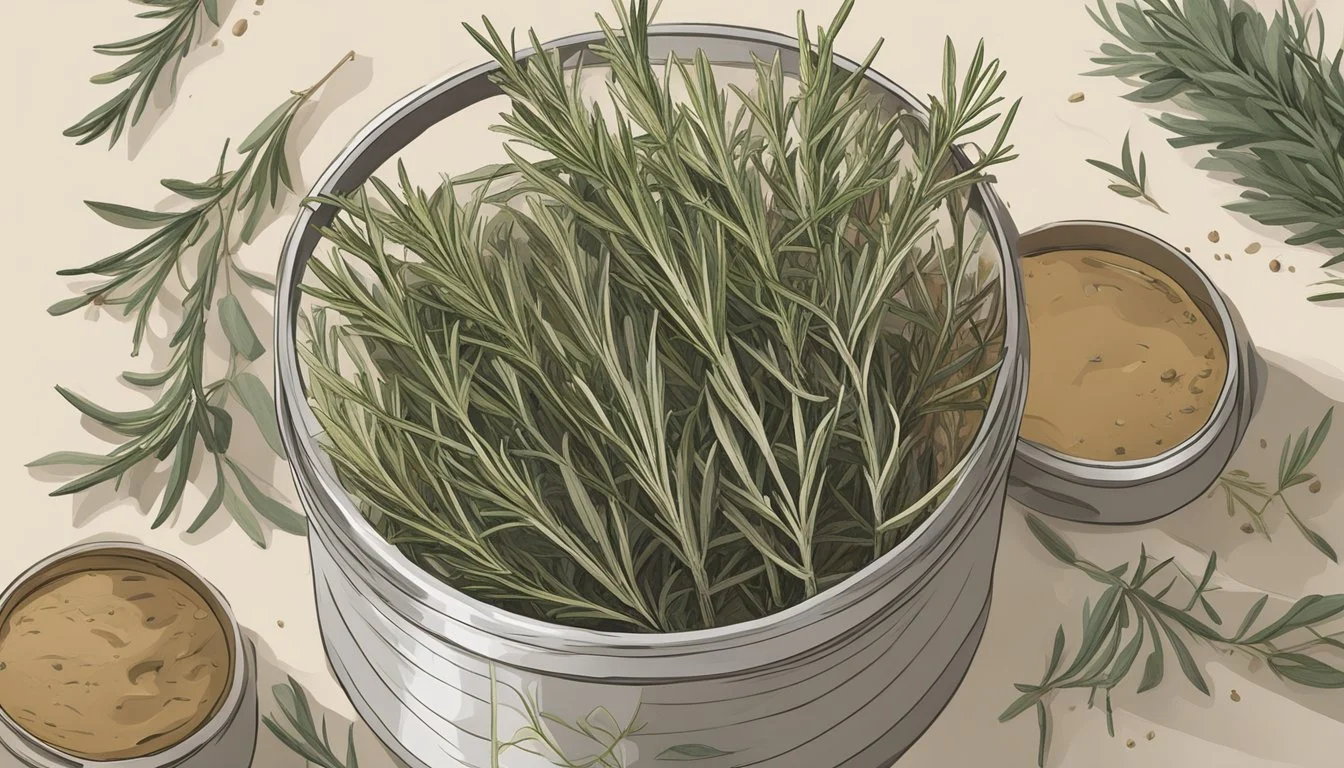How Long Does Dried Rosemary Last?
Shelf Life and Storage Tips
Dried rosemary, known for its aromatic and flavorful contribution to various dishes, has a considerable shelf life, making it a staple in kitchens around the world. When stored properly, it can remain at its best quality for about 1 to 3 years. The longevity of dried rosemary is influenced by factors such as storage conditions and the quality of the herb itself. Proper storage means keeping it in airtight containers away from heat, moisture, and direct sunlight, which helps to preserve its flavor and potency over time.
The shelf life of dried rosemary is notably longer than that of its fresh counterpart, which typically lasts up to two weeks when refrigerated. The drying process removes moisture, which decreases the likelihood of mold growth and bacterial development. With this in mind, consumers can use dried rosemary over an extended period without a significant loss of its distinct taste, provided it is kept in ideal conditions. While the herb may be safe to consume beyond the three-year mark, its flavor and aroma may begin to diminish, suggesting a decrease in culinary quality.
In light of this, understanding the proper storage and expected shelf life of dried rosemary is essential for both culinary professionals and home cooks. Adhering to optimal storage guidelines not only ensures maximum flavor but also promotes better utilization of the herb, reducing waste and maintaining the quality of the dishes in which it's used.
Understanding Dried Rosemary
Navigating the use of dried rosemary involves appreciating its difference from the fresh variety and recognizing its health benefits. Both forms of the herb are championed for their unique flavor profiles and potential contributions to health.
Fresh vs. Dried Rosemary
Fresh rosemary is known for its bright, pine-like aroma and is a softer, more versatile ingredient when used in cooking. In contrast, dried rosemary possesses an intensified flavor due to the concentration process during drying. Proper storage of dried rosemary in a cool, dark, and dry place can preserve its taste, typically:
For 1 to 3 years with optimal storage
At peak quality for 6 months to 1 year after packaging
Quality storage entails airtight containers that protect the herb from moisture and light.
Health Benefits
Rosemary, whether fresh or dried, is lauded for being rich in antioxidants and anti-inflammatory compounds. These qualities suggest multiple health benefits, such as:
Boosting cognitive function and possibly improving memory due to the presence of compounds like carnosic acid
Contributing to hair growth when used in specific topical treatments
However, while both forms of rosemary deliver these benefits, dried rosemary may offer a more concentrated source of these valuable antioxidants, given that drying herbs can intensify their components.
Optimal Storage Conditions
To ensure the longevity and preserve the flavor of dried rosemary, one should focus on providing optimal storage conditions tailored to protect the herb from degradation factors like moisture, heat, and light.
Choosing the Right Container
For maintaining freshness, dried rosemary should be stored in airtight containers. Glass jars are preferred for their nonporous nature, which prevents odors and flavors from transferring. Plastic bags may be used if they are sealable and can expel excess air. The key is to minimize the herb's exposure to air and moisture, which can significantly reduce its shelf life.
Best Storage Locations
One should store dried rosemary in a cool, dark place to protect it from temperature fluctuations and light, which can hasten the loss of potency. Ideal locations include a pantry or a cupboard, specifically one that’s away from sources of heat like the stove or oven. Moisture can be a concern in some storage areas, so ensuring the location is dry will help prevent mold and mildew growth.
Temperature and Light Considerations
Controlled temperature and minimal light exposure are crucial. The storage area's temperature should remain between 50°F (10°C) and 70°F (21°C). Exposure to direct sunlight or intense artificial light can degrade the quality of dried rosemary, so it's best kept in an opaque container if the storage area isn't completely dark. A consistent temperature and avoidance of light will maximize shelf life and maintain the herb's flavor and aroma.
Maximizing Shelf Life
Ensuring the longevity of dried rosemary involves proper storage techniques and understanding the differences between drying and freezing. The optimal retention of texture, color, and scent is achieved by creating ideal conditions that minimize spoilage.
Dry vs. Freeze
Dried Rosemary:
Shelf Life: When stored in an airtight container in a cool, dark place, dried rosemary can last from 1 to 3 years, retaining its potent scent and flavor.
Storage Conditions: Humidity and light are two enemies of dried herbs, as they can lead to faded color and diminished flavor.
Freezing Rosemary:
Texture Preservation: Freezing rosemary can maintain the texture better than drying.
Freezing Instructions: To freeze, one can wash the sprigs, pat them dry completely, and place them in airtight freezer bags or containers. Use within several months for optimal quality.
Preventing Spoilage
Airtight Containers: Store dried rosemary in containers with tight-fitting lids to guard against moisture and mold.
Labeling: Clearly label the container with the date of storage; this makes it easy to track the age and ensures use within the maximum shelf life frame.
Inspection: Regularly check the dried rosemary for any changes in smell, texture, or the presence of mold. Spices that show signs of spoilage should be discarded.
Foods Preservation: Incorporating rosemary into foods preservation techniques like infused oils or vinegar can be an alternative way to extend its usability while providing a distinct flavor enhancement.
By adhering to these specific storage methods, one can effectively extend the life of dried rosemary and prevent premature spoilage.
Culinary Uses and Preservation
Dried rosemary leaves are a versatile herb commonly used to flavor food. They retain their flavor profile for a long time when stored properly. The essential oils in rosemary provide both taste and aroma that enhance a variety of dishes.
Cooking with Dried Rosemary
In cooking, dried rosemary is used to season a wide range of dishes due to its robust flavor. It is particularly favored in sauces, soups, and marinades, as well as for seasoning chicken, fish, and vegetables. It is often added to pasta as well. One teaspoon of dried rosemary is equivalent to three teaspoons of fresh rosemary, making it a powerful ingredient in a home cook's arsenal.
Enhancing Flavor through Storage
Proper storage of dried rosemary is critical to maintaining its potent flavor. For the best results:
Store in a cool, dark cupboard.
Keep away from direct heat or sunlight.
Ensure the herb is kept dry and in an airtight container. Following these steps can help dried rosemary leaves last up to three years while preserving their aroma and taste.
Preparing and Drying Fresh Rosemary
The process of drying rosemary amplifies its flavor, making it more concentrated than fresh herbs. To dry rosemary at home:
Wash the fresh rosemary and pat it dry completely.
Arrange the rosemary sprigs in a single layer on a baking sheet.
Place in an oven set to the lowest temperature until the leaves become brittle.
Rehydrating Dried Rosemary
To rehydrate dried rosemary for recipes that call for a fresher flavor profile, one can simply steep the leaves in hot water. This is commonly done when making rosemary tea or other teas. Additionally, rehydrated rosemary can be used to create infusions like rosemary salt or compound butter, imparting a subtler aroma and taste than when it's used dry.
Determining Rosemary Quality and Potency
When assessing the quality and potency of dried rosemary, one should focus on sensory evaluation, visual indicators, and the decision-making process regarding when to replace the herb. These elements collectively determine the freshness and efficacy of dried rosemary in culinary applications.
Sensory Evaluation
The sensory attributes of dried rosemary—smell, taste, and texture—are critical in assessing its quality. Dried herbs should retain a strong, characteristic aroma. A pronounced scent suggests that the essential oils, which are responsible for flavor and aroma, are still present. To test, one can crush a small amount of rosemary in their hands and inhale. If the aroma is weak, the rosemary may have lost some of its potency.
Visual Indicators
Color and texture serve as visual cues to the condition of dried rosemary. Freshly dried rosemary leaves should have a vibrant green hue and be slightly flexible but brittle enough to crumble when pinched. Over time, these leaves may become brown and lose color, indicating degradation. A visual inspection can aid in determining if the dried leaves have maintained their original appearance, which is linked to flavor preservation.
Making the Decision to Replace
One should consider replacing their dried rosemary if the sensory and visual evaluations suggest a decline in quality. If the leaves have lost their vibrant color, become too brittle, or the scent has diminished, they are likely not as effective in imparting flavor. As a general guideline, dried rosemary typically maintains its quality for about 1 to 3 years depending on storage conditions. However, rosemary that fails to meet these sensory and visual benchmarks should be replaced to ensure the best culinary outcome.
Alternative Uses and Related Topics
While dried rosemary is commonly used for culinary purposes, its versatility extends into holistic health practices, gardening, and personal care. These alternative applications not only make use of rosemary's aromatic and preservative qualities but also capitalize on its health benefits.
Rosemary in Holistic Practices
In holistic medicine, rosemary is acclaimed for its antioxidant properties, which are believed to provide various health benefits. Rosemary tea, often found in health food stores, is consumed for its potential to enhance memory and concentration. The essential oil of rosemary is also utilized in aromatherapy to alleviate stress and boost overall well-being.
Gardening Insights: Growing and Propagating Rosemary
Rosemary is not only easy to grow and maintain but can also be propagated from an existing plant. Gardeners favor rosemary for its drought-resistant qualities, and a single plant can provide a plentiful supply for a household. It thrives in well-draining soil and benefits from full sunlight, making it a hardy addition to any garden.
Rosemary for Hair and Skin
The benefits of dried rosemary translate well into hair and skin care. When infused into olive oil, it can be applied to the scalp to potentially stimulate hair growth. Furthermore, its antioxidant properties are advantageous when used in skin products, contributing to improved skin health. Dried rosemary can also be found as an ingredient in natural shampoos or skin creams available at both grocery stores and specialty retailers.
Additional Information
This section addresses common queries about dried rosemary's longevity and provides guidance on purchasing and labeling norms.
FAQs about Dried Rosemary
How should one store dried rosemary to maximize its shelf life?
Dried rosemary should be stored in an airtight container, placed in a cool, dark location—away from sunlight, moisture, and heat. This could be a spice cabinet or a kitchen drawer that isn't exposed to heat from appliances or cooking.Does freezing extend the life of dried rosemary?
Freezing rosemary is more common with fresh sprigs to retain flavor, but dried rosemary can also be frozen in an airtight container or freezer bag to potentially extend shelf life beyond the usual 1 to 3 years.Can dried rosemary still be used after its expiration date?
While its potent flavor may diminish over time, dried rosemary that has been stored properly often remains safe to use past the expiration date if there are no signs of spoilage or an off odor.Are there any health benefits associated with dried rosemary?
Rosemary is known to have anti-inflammatory properties and may aid in enhancing memory, although it's typically consumed in too small amounts as a spice to significantly impact health.
Where to Purchase and Labeling
Where can one procure dried rosemary? Dried rosemary is readily available at grocery stores, health food stores, and online retailers. When shopping for spices, consumers have access to a variety of brands.
What should consumers look for in the labeling of dried rosemary? Labeling often includes the origin, "best by" date for quality reference, whether the rosemary is organic or non-organic, and any additional spices or salt added to the mix.
Is there a common substitute for dried rosemary in recipes? If dried rosemary is unavailable, dried thyme (how long does dried thyme last?) or oregano can be used as a substitute in many recipes, though they will impart a different flavor profile.
Conclusion
When stored properly, dried rosemary leaves can maintain their quality for a considerable time. Optimal conditions include keeping the rosemary in an airtight container located in a cool, dark environment away from direct sunlight or heat. Under such circumstances, one can expect dried rosemary to retain its flavor and potency for:
1-3 years, according to general shelf life tips.
Up to 2 years, as suggested by storage best practices.
The longevity of dried rosemary is influenced by several factors, which include:
Storage Conditions: A cool, dry place preserves its quality.
Quality of the Leaves: Initially high-quality dried herbs last longer.
Packaging: Airtight containers prevent moisture and odor absorption.
Moisture Content: Lower moisture content can extend shelf life.
To sum up, individuals can enjoy the maximum benefits of dried rosemary by adhering to these storage guidelines. It is worth noting that while dried rosemary can last for years, its flavor may diminish with time, so it is recommended to periodically check its potency. Freshness can be assessed by aroma and appearance, and it may be appropriate to replace older supplies with new ones to ensure the best culinary experience.







